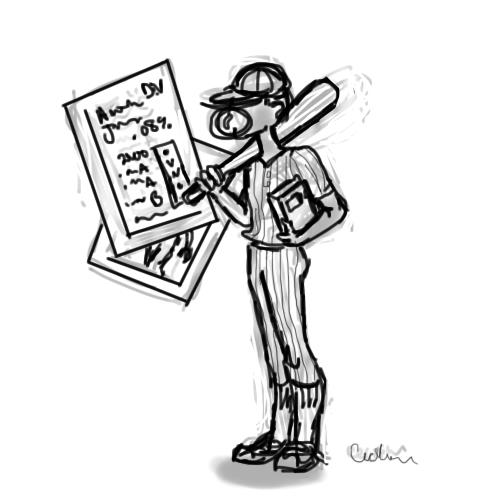
News
When Professors Speak Out, Some Students Stay Quiet. Can Harvard Keep Everyone Talking?

News
Allston Residents, Elected Officials Ask for More Benefits from Harvard’s 10-Year Plan

News
Nobel Laureate Claudia Goldin Warns of Federal Data Misuse at IOP Forum

News
Woman Rescued from Freezing Charles River, Transported to Hospital with Serious Injuries

News
Harvard Researchers Develop New Technology to Map Neural Connections
Moneyball for Admissions
Harvard Could Benefit from Adopting a More Data-Driven Approach to College Admissions

When I read Ruth Starkman’s New York Times op-ed “Confessions of an Application Reader” about her experience as an admissions reader, a scene from the sports movie “Moneyball” came to mind. In the movie, when the newly-hired Oakland Athletics General Manager Billy Beane walked into a free-agency meeting, the Athletics front office staff was evaluating baseball prospects on factors such as “you can hear his [hit] all over the ballpark,” and defended the same loud-hitting player’s poor batting average by the gut feeling that “if you give him four hundred bats, he could be better.” Billy Beane rejected this old norm in baseball scouting, and instead used quantitativemodels to scout and sign undervalued prospects. Billy Beane’s effort allowed the Athletics to build a team that rivaled the Yankees, while spending one third of what the Yankees spent on players.
Baseball scouting has come a long way since Billy Beane’s innovation. Yet, surprisingly, holistic assessment and gut feelings still prevail in college admission. Despite the objective criteria that Starkman was instructed to follow, the admissions process was confusingly subjective. In Starkman’s training sessions, she was told to look for the “bigger picture” of a candidate’s life and that candidates who “help build the class” were more valuable. At times, these criteria seemed purposefully vague to encourage subtle racial discrimination and preference for wealthier students. When she asked why an academically talented Asian student was ranked lowly, her colleague replied: “Oh, you’ll get a lot of them.” The application of such vague criteria was dictated by the discretion of experienced readers. In the “norming sessions,” experienced admissions readers guided the new readers to conform their decisions to a predetermined score. Rather than evaluating a student’s merits with a clearly defined metric, readers were conditioned to rank students based on how they thought other readers, especially more senior ones, would rank them.
Just like baseball scouting based on the decibels of hits, this holistic approach to admissions could use some help from Billy Beane’s quantitative approach to decision making. Colleges already have extensive records of each applicant’s academic profile in high school, as well as an enrollee’s record at and after college. With this incredibly comprehensive data set, a good data scientist can create models that use the student profile to predict future success. What are common high school extracurricular activities for student leaders in college? Which AP classes are most predictive of student GPA in college? Are active volunteers in high school more likely to donate to their alma mater? These are relevant questions that, if answered by existing data, can help colleges to pick a class of underappreciated leaders and academic stars, with the side benefit of a greater endowment in the future.
The quantitative approach also corrects inherent biases in the admissions process. Thomas Espenshade and Alexandria Radford’s “No Longer Separate, Not Yet Equal” discusses how admissions readers are 60 percent more likely to reject students who excelled in ROTC, 4-H clubs, and Future Farmers of America, likely because the typical admissions reader with an east-coast, urban background is unfamiliar with or unsympathetic towards student activities with a rural bent. A more data-driven and impersonal evaluation of student extracurricular accomplishments will not rely on the admissions readers’ cultural assumptions, and will help admissions readers avoid stereotypes that human judgment is prone to making.
Students, especially those from unconventional backgrounds, will benefit tremendously from this data-driven approach. Colleges can identify talented but unconventional students using the equivalents of Billy Beane’s new baseball metrics. For instance, if data shows that low SAT writing scores may not reflect the creative writing ability of immigrant students, admissions offices can find future poets and novelists by placing more weight on the personal essay rather than SAT writing for immigrants. Admissions readers are already looking out for such profiles, but data can only make their judgments more informed.
Of course, one can object that it will be easier to game the data-driven system—students can mimic the “ideal candidate profile” to improve chance of admissions. This type of gaming already exists.The holistic and mysterious admissions criteria have enabled college counselors to extract thousands of dollars with inside knowledge of the admissions office. The opaqueness of the system benefits students with resources and connections, and hurts those without. Making this mysterious process more transparent will only level the playing field. In other words, it is fairer to accept a student who crunches the numbers to find out what activities predicts success in college and pursue those activities, rather than someone whose essay has been manicured by expensive college counselors.
Billy Beane’s success was not just a tale of the revenge of the nerds. It was also the story of a new idea breaking through institutional resistance. Harvard, being the Yankees of higher education, should learn to work smartly with its resources and avoid instinctive resistance to new ideas. College admission, like baseball recruiting, will be a numbers game, and Harvard should be ready to play smart.
Jonathan Z. Zhou ’14 is an applied mathematics concentrator in Eliot House. His column appears on alternate Wednesdays.
Want to keep up with breaking news? Subscribe to our email newsletter.
